EXCLUSIVE: A Two-Year Road to Genocide. Israel-Palestine Conflict. Its Past, Present, and Future.
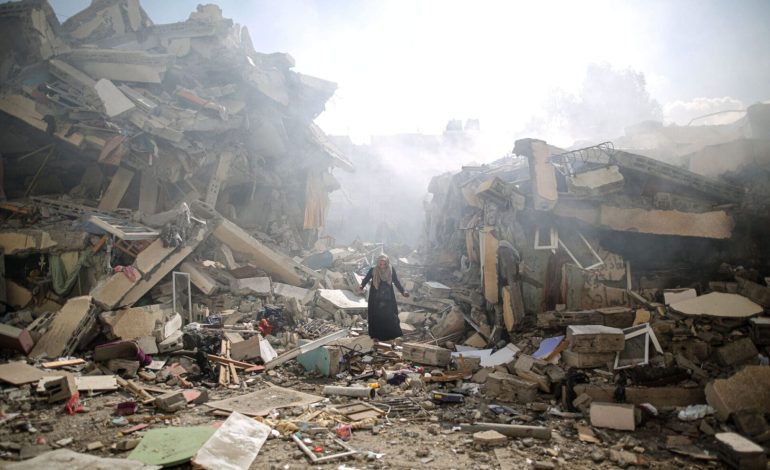
After nearly two years the deadly Israeli assault on Gaza continues. The tightened blockade has choked off food, water, fuel, medical supplies, and electricity. That has led to near-total displacement of its 2.3 million people, widespread famine-like conditions, and a health system on the brink of collapse. The UN and other aid groups warn of a man-made famine.
Fighting is intensifying once again. In the last 24 hours, Israeli strikes on Gaza City killed 123 people, marking the deadliest day in a week. Civilians—especially those seeking desperately needed aid—are among the casualties. UN observers have condemned these attacks, referring to Gaza’s decimated healthcare system as “medicide.”
The conflict continues to exact a deadly toll on journalists. Recently, five Al Jazeera reporters—including Anas al‑Sharif—were killed in an Israeli strike on a tent near Gaza City’s al‑Shifa Hospital. International outrage has surged.
Diplomatic efforts are ongoing: Israel may dispatch negotiators to Doha for talks focused on securing a comprehensive hostage exchange and lasting truce. Meanwhile, Israeli military leadership is reportedly advancing a plan to reseize parts of Gaza City.
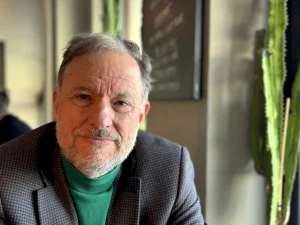
To paint a broader picture of the conflict, the international reaction, the potential for peace, and the protest movement, Wyoming Star sat down with Dr. Stephen Zunes, a Professor of Politics and International Studies at the University of San Francisco. Dr. Zunes has almost four decades of experience in Middle Eastern politics, US foreign policy, international terrorism, nuclear nonproliferation, strategic nonviolent action, and human rights.
Wyoming Star: I want to begin our conversation with a little history background, because some people still believe it all started on October 7th, and it’s important to show that this conflict is much older than that.
Stephen Zunes: Basically this conflict is about two people who claim historic ties to the same land. It’s not ultimately about religion. If a European-based movement of Christians, or even European Muslims, came into Palestine and dispossessed the population and tried to develop an ethnically identified state that excluded them, there would be as much hostility. This is not a religious conflict, first and foremost, and that hasn’t stopped extremists, both Jewish and Muslim, from trying to turn it into one. Not to mention some Christian fundamentalists in the West as well. But in these two competing nationalisms, Israel ultimately won. And while Zionism for Jews was a national liberation movement for historically oppressed people, like many of the nationalist movements that were arising during the late XIX century. To the Palestinians, it felt more like a colonial settler enterprise, like the French in Algeria or the British in Rhodesia. This is really where the resistance and the conflict begin. And because of the support from the West and their own technological prowess, the Israelis have had the upper hand, not only claiming 78% of historic Palestine in the First War, which led to the fleeing and expulsion of the majority of the indigenous Palestinian population, but, since 1967, they’ve had effective control of the rest of Palestine as well, giving the Palestinian Authority these tiny urban enclaves, surrounded by Israeli settlements. Hardly a state. When Hamas illegally seized power from the Palestinian Authority in Gaza, Gaza’s been under siege ever since, and when a territory is under siege, where people can’t come and go when they please, or trade, or whatever, that is legally considered an occupation. Still, the real failure of the peace process is the fact that the United States has this contradictory role of being the primary mediator and the primary military, financial, and diplomatic supporter of one of the two sides, the more powerful of the two sides. Anybody who’s studied conflict resolution knows that’s totally unworkable. So in many ways, it’s encouraged the more extreme Israelis, who feel like they have nothing to lose. And the more moderate Palestinians, like the Palestinian Authority, who long ago accepted Israel’s right to exist and agreed to accept only 22% of historic Palestine for their state, are being told that’s too much by the Israelis and the Americans. Israel continues to colonize the occupied West Bank, which is illegal under international law. And it’s encouraged the rise of extremists like Hamas. In fact,
Hamas would have never seized power in Gaza had the US not pushed some hardline elements in Fatah to try to stage a coup to throw them out of the coalition government. And the result was Hamas staged a counter-coup and ended up seizing Gaza. There are so many things that could have been resolved. Unfortunately, it has a lot to do with the fact the United States has not been the honest broker.
Wyoming Star: So this brings us to October 7th. The Palestinians exhausted all the possibilities for the peace negotiations.
Stephen Zunes: Well, there had not been peace negotiations for years. Hamas, of course, has never negotiated with Israel. Israel refuses because of their terrorism and the like. The Palestine Authority has broken off because the United States ended up effectively endorsing Israel’s annexation of Greater East Jerusalem and claiming the settlements as a part of Israel and prejudging all the things that they’re supposed to talk about. And there’s this thing called the Abraham Accords, where the United States is trying to get the Arab countries to recognize Israel. But all Arab countries have already agreed to recognize Israel in return for the end of the occupation. This push to get them to recognize Israel beforehand is essentially an effort to weaken the only hand the Palestine Authority has for statehood. And the ones that have recognized Israel, except for a small contingent that Morocco sent in the 1973 War, none of them have ever been at war with Israel. These states are between 700 and 2,000 miles away. And again, they’re not a threat to Israel. These are two tiny sheikhdoms in the Persian Gulf that agreed to join the Accords in return for a big, lucrative arms package by Trump. And Morocco agreed in return for Trump recognizing Morocco’s illegal annexation of Western Sahara. That’s the other occupation people don’t talk about, but it’s an important one, where Morocco, like Israel, illegally invaded and occupied and is colonizing their neighbor. And in the case of Morocco, they’ve annexed the entire country, even the part they’ve never occupied. It’s still liberated territory by the recognized Western Saharan government.
In other words, the Abraham Accords, that so-called peace process, were never going anywhere anyway, because there will not be peace until the Palestinians have a state of their own or are incorporated as equal-rights citizens into a greater Israel.
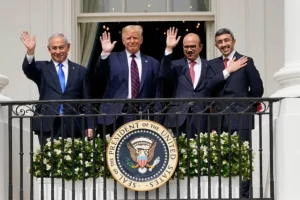
Wyoming Star: And what is the point of the Abraham Accords? Is it Trump’s legacy project? What is it supposed to be?
Stephen Zunes: It tries to perpetuate the myth that the conflict is between Israel and the Arab states. And again. They’ve all agreed to have peace in return for the end of the occupation. So it’s a way of taking attention away from the Palestinian question, which has always been the core issue from the very beginning. And make Trump look like this great peacemaker for normalizing relations. And frankly, the Moroccans and the Emiratis and the Bahrainis were having informal contacts and even economic relations with Israel for years. This really is not the big breakthrough that Trump tries to make it out to be.
Wyoming Star: One of the core states still refusing to join the Accords is Saudi Arabia, which has tremendous ties with the United States, with US military bases and US troops stationed there. All of these countries are in the US’ sphere of influence, making it some kind of an internal conflict. There is this other thing, called the Two-State Solution. Is this a realistic and viable project? There were a number of steps back in the 90s to recognize the Palestinian claim to a state, but in the end, they are still not a recognized state. They are basically a territory occupied by Israel.
Stephen Zunes: The vast majority of the world’s countries, about three-quarters at this point, have recognized the state of Palestine. The United States, despite claiming to support a two-state solution, only recognizes Israel. It’s pushing countries to unilaterally recognize Israel and has actually applied diplomatic pressures to countries and international institutions that have recognized Palestine. The double standards are so flagrant. For example, they say, “We’ll cut off all ties with the Palestine Authority if they have even one cabinet member that doesn’t explicitly support Israel’s right to exist, that supports armed attacks against civilians, and that doesn’t agree to previous peace agreements.” But the Israeli government is headed and is dominated by people who refuse to recognize Palestine’s right to exist, who support these far-right settler militias, which are killing civilians (these are terrorists too), and reject the Oslo Agreement and other previous disengagements. So again, we see this double standard, that the saying, “Oh, we support a two-state solution,” But then saying, “Oh, the two sides have to work it out among themselves.” Yes, Israeli Jews and Palestinian Arabs, indeed, have equal rights. Equal rights to safety and security and self-determination—all these good things. But what this policy ignores is the gross asymmetry in power between the Israeli occupiers and the Palestinians under occupation. When Iraq invaded Kuwait in 1990, we didn’t say, “Okay, you two, you have to work it out among yourselves.” Because we recognize, along with the international community, that it’s illegitimate to expand your territory by force, and the international law had to be upheld. Now, there’s a big debate as to whether going to war was the best way or the only way to reverse the occupation. But the whole world agreed that it was wrong. And you couldn’t expect the Kuwaitis to be able to negotiate their way out of their occupation. If the Palestinians had a viable state of their own, we wouldn’t be in this situation. If they allowed it back in the 1990s. But even under the more moderate Israeli governments, they were continuing to colonize the occupied territories. And the so-called generous offer that Ehud Barak gave to the Palestinians, together with Clinton, the most generous offer the Israelis had ever given before up to that point, would have divided the West Bank into four non-contiguous cantons, where Israel would control the movement, not just into Israel, which of course is their right, but into any neighboring Arab states, even in between the four sections, creating the same problem we have today with the checkpoints—getting crops to market, and people to hospitals, etc. And Israel would control the water, and Israel would control the airspace. I mean, it’s kind of like a Bantustan. And also the Palestinians would not get to East Jerusalem, the Arab section. Israelis would annex all of Greater East Jerusalem, except this little tiny village on the outskirts called Abu Dis, and that would be the Palestinian capital in Jerusalem. Which it wasn’t. But ever since then, both Republicans and Democrats have been saying, “Oh, the Israelis gave the Palestinians everything they wanted, and they rejected it, and so it shows they don’t want peace,” but that’s patently not true. They got close. In fact, they got actually closer in the Taba talks in January of 2001, where the US was not present, than they did when the US was trying to be the balanced broker. And unfortunately, with Ariel Sharon being elected Prime Minister of Israel a couple weeks later and Bush becoming President of the United States, we haven’t been close to peace yet.
And now, of course, because of the increased colonization and the demographics being changed so radically, there are many, many people, myself included, who have worked for a two-state solution for decades, who are recognizing it may be too late.
And it’s not like we’ve suddenly become hardline Zionists or anything like that, just realistically, because it really does resemble an apartheid situation. Amnesty International, Human Rights Watch, Israeli groups like B’Tselem, and others have recognized that it does meet the international legal definition of apartheid. And perhaps the best, most realistic hope at this point is a single binational state that has equal rights for both Israeli Jews and Palestinian Arabs. That’s what most people mean when they say “from the river to the sea.” Some people are saying, “Oh, you want to kill all the Jews and drive them out, or whatever.” No. There are a few extremists who unfortunately actually think that way, but the vast majority, and polling data shows this, are simply talking about a democratic secular state, or some kind of binational state between the Jordan River and the Mediterranean, that would include Israel within its internationally recognized borders, the West Bank, and the Gaza Strip, again, with guaranteed rights for whoever the minority is. And this is really what people are pushing for.
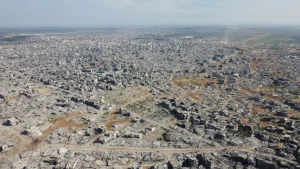
Wyoming Star: The Palestinians don’t even have a united government. The Gaza Strip is basically governed by Hamas and the West Bank by the Palestinian Authority. They have little to no connection between each other and don’t like each other very much.
Stephen Zunes: There have been proposals as of the ending of the war in Gaza that the Palestinian Authority would then take over in Gaza, but the Israelis reject that idea.
Wyoming Star: And Hamas basically has agreed to step down from power…
Stephen Zunes: What the United States and Israel are looking at right now, they’ve been quite explicit about, is the ethnic cleansing and creating this big Mediterranean resort. That’s really what this is about. And that’s why they’re destroying virtually every single building in places they’ve occupied, if anybody’s seen the pictures.
There are no Hamas fighters hiding behind every one of these buildings. These buildings were not destroyed in firefights. They have been systematically razed. And these include hospitals, universities, businesses, and apartment blocks. These are not Hamas bases or outposts, or anything like that.
Wyoming Star: The number of people killed, reported by the Gaza Health Ministry, has been 60,000 for some time already. President Trump, in one of his speeches earlier in the year, said that Palestine now, meaning almost 8 months ago, had “1.7 or 1.8 million” people alive. But before the war, the estimates were 2.3 million. That’s half a million people.
Stephen Zunes: There are a lot of disputes on the numbers, but certainly, many thousands are still buried beneath the rubble, because they don’t have the heavy machinery to remove them. What’s being ignored is the fact of the many tens of thousands of people who’ve died because they couldn’t get regular medical treatment—kidney dialysis, cancer treatment, getting to the hospital for some other emergency, childbirth, or whatever. So if you count those kinds of deaths, we may indeed be looking into the hundreds of thousands.
Wyoming Star: If I remember correctly, there are no cancer hospitals left in Gaza. Almost all, if not every, hospital has been attacked.
Stephen Zunes: And again, everyone’s talking about Al-Shifa, supposedly having a Hamas command post underneath. The Washington Post investigated and found no evidence whatsoever of this. To think that everything is somehow Hamas… And let’s see, even if Hamas was using human shields, and they found there’s actually been very little evidence they’ve actually been doing so. I mean, they’ve had their fighters and equipment too close, closer than they should be to civilian areas. But that’s different than human shields, where you’re actually physically preventing people from fleeing. You’re putting them between you and the people firing at them. That’s a more serious war crime. They really haven’t found many cases of that, but even if there were, international law, Protocol 1 of the Fourth Geneva Convention, is very clear. That still doesn’t give you a right to kill the civilians there. To use a domestic example, if during some botched bank robbery, the robbers were holding customers and bank staff hostage, firing from behind them at the street, the SWAT team wouldn’t come in and then kill everybody and say, “Oh, it’s not our fault. They were using human shields.” So this really is, and I was reluctant to use this term, but Israel is in violation of the Genocide Treaty. They are committing a genocide. Now, ‘genocide’ is one of those rare words where the legal definition is actually somewhat broader than the popular definition. There are other genocides going on right now in Sudan, Myanmar with the Rohingya people, and Burma, but this is the one that the US is actively supporting. And again, not the first genocide we’ve supported. Look at East Timor. We can think of Guatemala in the early 1980s, the US-backed junta, and the indigenous peoples, and indeed Bangladesh, 1971, when the US was backing Pakistan. But it really does cross the line into genocide. Amnesty International, Human Rights Watch, Israeli groups like B’Tselem, the physicians working there, and the human rights groups. I mean, yeah, it’s real.
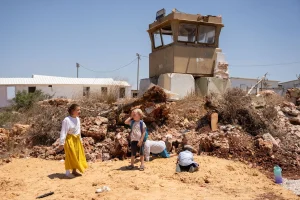
Children play by a guard tower in the Jewish settlement of Evyatar in the West Bank on July 18, 2024 (Maya Levin for NPR)
Wyoming Star: Getting back to the two-state solution, even if in a hypothetical scenario, Israel agrees. We have the precedent of them moving out of the Gaza Strip in the early 2000s, leaving the settlements. But what about the West Bank? The settlers there hold real political power.
Stephen Zunes: The thing is these are all illegal. And in terms of the Fourth Geneva Convention and in their application, the West Bank has been confirmed by no less than five unanimous United Nations Security Council resolutions. Again, there is no question of the illegality. But in case there is a miracle, there is some two-state solution. I don’t think anybody’s realistic who’s saying, “All the Israeli settlers have to move back to Israel.” What they could do, for example, is they could live in the new Palestinian state as Israelis, and they would have rights. But they’d have to abide by Palestinian law. And similarly, for that matter, Palestinian citizens of Israel could become citizens of Palestine as long as they abide by Israeli law. So a two-state solution doesn’t require the physical removal of all the settlers. Though one could also argue that given the Palestinian refugees in Lebanon, Syria, and Jordan, who might want to move back to a Palestinian state. They’ve not been able to do so at this point. If whatever Israeli settlers didn’t want to live in Palestine and moved back to Israel, these settlements could become homes for the repatriated Palestinians.
Wyoming Star: But some probably would not want to return to the territory assigned to the Palestinian state, because they still dream of returning to their pre-1949, pre-Nakba homes.
Stephen Zunes: Legally, all Palestinians have the right to return, even to Israel itself. All of them have the right to leave their homeland or return to their homeland. Now, the first half of that was a big cause for Soviet Jewry, who were trying to flee in the final decades of communism, and all these major Jewish groups in particular had a lot of allies saying, “We’ve got to uphold this principle of international law.” But when it comes to the other half of that principle about the right to return to your country. Because the way it is right now, a Jewish person in the United States, or whatever, could just arrive in Israel, immediately become a citizen, and move into a home of a Palestinian, who is not allowed to return to it based purely on their ethnicity and religion. And, you know, there is something inherently pretty discriminatory about that.
Wyoming Star: And in the worst-case scenario, they can move to the West Bank because of the subsidized housing.
Stephen Zunes: At least two-thirds of the settlers are there for economic incentives, not ideological ones. Without those subsidies, you know, a lot of them, I think, would move back to Israel.
Wyoming Star: Let’s talk about the situation in the region, because right now, Israel, technically, wages war against 5 countries—Palestine, Syria, Lebanon, Yemen, and, well, Iran. In some form or another. What is the strategic objective of Israel? Is it to create this vision of Greater Israel, or is it some internal political calculation by Benjamin Netanyahu?
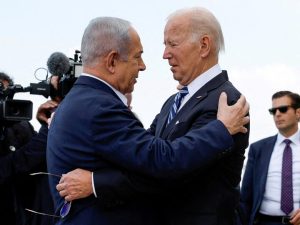
Stephen Zunes: People in power right now are definitely expansionists. They definitely want a Greater Israel to include not just Israel proper and the West Bank and Gaza, but even the Golan and much of southeastern Syria, and there are some of them who are still looking at Lebanon south of the Litani River. They’re even looking at the east bank of Jordan. And so there are definitely ideologues, nationalists, religious fundamentalists, and others who do have that vision. And they also just see themselves as an ally for Western interests. One former US Secretary of State called Israel our “unsinkable aircraft carrier.” Biden, both as a senator and as a president, said, “If it weren’t for Israel, we’d have to invent them” in terms of having this reliable ally. Because our Arab allies could be overthrown in a coup or revolution, but Israel’s there to stay. I’ve long argued that the main reason the US supports Israel is not because it’s this struggling democracy about to be overrun by the Arab hordes. If that was the case, we would have delivered most of our arms in the first 20 years of Israel’s existence, when it was most democratic and most vulnerable strategically. Instead, 99% of the US arms shipments to Israel have happened since 1967, when they proved themselves more powerful than any combination of Arab armies and became more and more repressive. In fact, indeed, the more right-wing and repressive, and the stronger they are militarily relative to the Arab neighbors, the more US aid. And it’s the inverse correlation if we were really concerned about defending Israel. And it’s not even the pro-Israel lobby that much, frankly, because, when presidents decided to go around the Israel lobby, they did. Eisenhower and the Suez Crisis, Carter and the first invasion of Lebanon, Reagan and the AWACS sale to Saudi Arabia, the senior Bush and the loan guarantees, and Obama and the Iran agreement.
The president always wins. The AIPAC can make it more difficult to challenge US policy, and they make it hard to make progress in Congress, but US policy would be more or less the same.
We supported other occupations, like Morocco currently and Western Sahara, but previously Indonesia and East Timor, and apartheid South Africa and Namibia. We’ve supported other allies engaging in genocidal wars, as I noted earlier. So I think the main reason we support Israel is the same reason we support other allies. They’re seen to be in our strategic advantage. Now, there are some people who argue, and I think correctly, that ultimately this hurts US strategic interests, because it’s getting a billion and a half Muslims angry. It makes it seem hypocritical when we talk about Russian expansionism, or Iranian human rights abuses, or other things, nuclear or other issues where there’s a clear double standard. So one can make an argument it actually hurts US strategic interests. But for now, at least, the consensus among most national security managers is that it’s to our advantage to support Israel. And along with that you have the right-wing Christian fundamentalists who see supporting Israel as necessary for the second coming of Christ.

Wyoming Star: Well, is this fundamentalist religious argument real? Or is this an excuse to drive attention away from the political benefits of supporting Israel?
Stephen Zunes: The second coming of Christ is pretty darn important for the fundamentalists or Christians in general. But if you’re a fundamentalist who thinks that the way to go about that is to support Israel, yeah, you’re going to make it a priority. And many do. You also have this old generation of liberals, who dominate the Democratic Party leadership, who have this kind of sentimental thing about Israel, who think of Israel when it was more vulnerable, when it was more democratic, and who grew up in the shadow of the Holocaust with the guilt around the lack of action to save European Jewry. And this kind of nostalgia for the plucky kibbutzniks and any of the progressive social institutions Israel established, at least in its earlier years. It kind of reminds me, actually, of some of the romantic views a lot of leftists have for various revolutions in the Global South, even when they start doing really nasty things, like Maduro or Ortega. People still try to defend them because they’re thinking of the ideal instead of reality. And I think there are a lot of old American liberals who have the same kind of rigid ideological commitment to Israel, even though things have really gotten much worse than their ideal vision of Israel.
Wyoming Star: Well, there are some experts in Israel who view this ongoing genocide as the way for Netanyahu to remain in power.
Stephen Zunes: Certainly. First, as far as he’s concerned, the longer the war goes on, the longer he’ll be Prime Minister, because they’re not going to have an election during the war, during a war. And when they do have an election, he’s almost certainly going to lose, and when he loses, he’ll no longer have immunity from prosecution.
Wyoming Star: But he is the longest-sitting prime minister of Israel. He’s been in power for almost 20 years.
Stephen Zunes: Yes.
Wyoming Star: How realistic is it that he will lose his power just because of the ending of the war? Because he has enlarged Israel substantially. The Golan is unlikely to be returned back to Syria anytime soon, because Ahmed al-Sharaa has basically surrendered himself to Israel.
Stephen Zunes: No, not really. His parents were born in the Golan and were among the victims of the ethnic cleansing that Israel did when they conquered it in 1967. But his priorities are obviously to try to rebuild his country and avoid further Israeli bombings and seizures of land. I don’t think he’s given up on retrieving the Golan. But I do think you’re right that it’s not going to happen anytime in the future. Not only is Israel redoubling their settlements with US support. But the United States is the only country that has formally recognized Israel’s illegal annexation. Back in 1981, when they annexed it, the UN Security Council unanimously, and this was under President Reagan, said, “This is null and void. No country can expand its territory by force.” Here we are today, when the US is saying, “Yeah, countries can expand their territory by force. Not Russia, but countries that we support can expand their territories by force, like Morocco, like Israel with the Golan.” Even Biden, who talks about the rules-based international legal order. He supported recognizing the annexation as well. And the crazy thing is that even under Assad, the Syrians agreed to recognize Israel, demilitarize the Golan, and have normal relations and security guarantees, and Israel, with US encouragement, especially under the Bush administration, refused to make a deal. And Sharaa would be open to an identical deal, but Israel says, “It’s not in the cards,” and with US recognition, it’s clear we’re not going to push them to do it either.
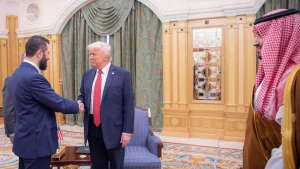
Wyoming Star: Sharaa does not have enough military power to hold the whole of Syria. He has 50,000 or 40,000 troops. And it’s not a real army, more like a militia-type fighting force. Enough to overthrow Assad but not much else.
Stephen Zunes: And that was more of a political collapse than a military defeat, in many respects.
Wyoming Star: What is the situation like in Lebanon?
Stephen Zunes: It’s a mess. Very dysfunctional government, and the corruption is rampant. The sectarian system that the French left behind, and that was backed by the United States over the years, has created, essentially, these competing fiefdoms that go for their share of the spoils, rather than for the common good. And there is a whole series of armed militias. We talked about Hezbollah, because that’s the largest, and there have been demands to disarm, and I certainly think they should disarm as well. But there are also other militias, including these right-wing ones that have been, over the years, supported by the US and Israel. They certainly need to disarm. It’s a shame because Lebanon has great potential. But they’ve been really shattered by this disunity and the fact that Israel, Syria, the United States, France, and Iran have tried to exert their influence on the country. But the Lebanese are capable of doing good things. I mean, think about 2005 when hundreds of thousands came out non-violently and forced out the Syrians, who had in many ways controlled the country for years. Technically it wasn’t an occupation, but it was kind of like the Warsaw Pact in the Soviet days. They were nominally independent, but there were certain limits about what the government could decide to do. But they pushed the Syrians out. That led to more free elections, and again, all non-violently. So the Lebanese civil society still has the potential to set things right, but right now the country’s a mess.
Wyoming Star: What about Yemen and the Yemeni Houthis’ activity in the Red Sea?
Stephen Zunes: Another tragedy that could have been averted. If the US had supported the pro-democracy movement instead of the old order, there would have been a broad coalition government and free multi-party elections. Instead, the US and the Saudis pushed for this election with only one candidate, this disgraced former general, who was the vice president of the previous dictator. Things fell apart, and then you got this multi-sided civil war. And the Houthis have taken control of about a third of the land and maybe two-thirds of the people. Because they were well-organized, and the opposition was divided between leftist southern secessionists, moderate Islamists, hardline Islamists, and a whole variety of various factions. And they ended up controlling things, throwing their weight around. There was some impressive nonviolent resistance to the Houthis for a time, but then when the Saudis started bombing, they ended up just killing civilians. And the Houthis, not being a recognized government, have certain leeway to attack shipping in the Red Sea, even attacking Israel itself. They said, “Well, none of the other Arab countries are coming to their defense. We might as well do so.” They’ve gotten some support from Iran, though it would be an exaggeration to call them a proxy. They definitely have their own agenda, their own origins. They’re welcome to accept Iranian support, but they’re not controlled by them.
Wyoming Star: Is Hezbollah more tied to Iran than the Houthis?

Stephen Zunes: Iran played a very important role in Hezbollah’s origins. And certainly Iran supplied them with their heavy missiles and the like. But again, they have their own agenda. In fact, most of their funding is from taxation in areas that they control. Iran does have some real proxies. These are the militias in Iraq. Even though some of them are nominally part of the Iraqi armed forces, they report directly to the Ayatollah or various people in the Revolutionary Guard. They had similar militias in Syria. I’m not sure what’s happened to them since Assad was overthrown. Those you can truly call proxies. It would be a slight exaggeration to say that of Hezbollah.
Wyoming Star: There have been reports of bombing runs by the Israeli Air Force into Iraq and Syria against these very forces. And al-Sharaa is fighting them as well.
Stephen Zunes: Let me add in terms of proxies. Hamas is by no means a proxy.
Wyoming Star: That’s a local resistance group.
Stephen Zunes: Iran has provided some money and some lighter weapons, but very little. They’ve had their issues. They’re on opposite sides in the Syrian Civil War. One’s Sunni, one’s Shia, there’s that… Both Hamas and the Iranian regime are pretty awful, but they’re not working in tandem, let’s put it this way. But anyway, just in terms of Iran itself. They are the only country in the region that is essentially challenging Israeli hegemony. And that’s why they’re targeted so much. If you look at the United States, what we say about Iran is, “You know, they suppress women and religious minorities, they don’t have free elections, they support extremist groups, and they take a very hardcore and also conservative interpretation of Islam,” etc. But you’d just say the same with Saudi Arabia. In fact, Saudi Arabia is worse, I would say, in those areas than Iran, even. But they’re okay because they’re a US ally. “But Iran has a nuclear program that could eventually become a nuclear weapons program and is in violation of the Non-Proliferation Treaty.”
Well, you know, Israel already has nuclear weapons, Pakistan already has nuclear weapons, and India already has nuclear weapons. Why is this singling out Iran? And again, the reason is that they are the only challenge to US and Israeli hegemony.
If you read the national security statement from the Bush administration, they basically say Iran is our regional rival in the Middle East. In any other region that would be China, but in the Middle East it’s Iran. Again, I’m not making any excuses for the regime. It really is awful. The vast majority of Iranians would like to see them gone. But it’s not the nuclear stuff, it’s not their human rights record, and it’s not their support for extremists. It’s that they’re challenging Israeli and American hegemony, so they therefore become a target.
Wyoming Star: Do you see the continuation of the Iranian nuclear program as feasible? Will they push for it now?
Stephen Zunes: In many ways, if you’re an Iranian, and you say, “We are labeled part of the ‘axis of evil’ by the US government, along with Iraq and North Korea.” Iraq eliminated the nuclear program. Allow inspectors of the International Atomic Energy Agency to come back in and confirm that. But their country was invaded, their government overthrown, and their country occupied anyway. North Korea, by contrast, throws out the IAEA inspectors and builds nuclear weapons. They’re still in power. What lesson do you get from that? Maybe you need a nuclear deterrent. And so, the bombing of the civilian nuclear facilities, and I should note, the Israeli bombing went well beyond the nuclear program, you know, targeting industrial, energy, and infrastructure…
Wyoming Star: Iranian official and military leaders have also been killed.
Stephen Zunes: Yeah. It probably only set back the program a few months. And again, they may say, “Hey, wow, we need a nuclear deterrent.” And that’s really what the fear is. I mean, I still don’t think there’s evidence that Iran wants to build a nuclear weapon, but if they did, it’s not like they’re going to make a suicidal attack against Israel. It’s not like they can reach the United States. For decades, we’ve had this policy of deterrence against the Soviets and the Russians, with their thousands of nuclear weapons aimed at us, and said, “Don’t worry, we have a nuclear deterrent.” So why are we freaking out about Iran getting one or two Hiroshima-sized bombs? And the reason is, again, they’re not going to have the suicidal first strike, but maybe that’s going to be a deterrent for Israel and the United States next time we want to invade a country in the region. That’s really what the fear is. It’s ultimately about hegemony. It’s not about the Zionist lobby forcing us to be anti-Iranian. We’ve intervened in that country for decades. Think about the overthrow of the democratic government of Mosaddegh in 1953, installing the Shah, and the hostility we’ve had since the revolution. The hostage crisis.
We don’t need Israel to get us upset about a militarized Iran.
Wyoming Star: Let’s talk about the human rights violations—the ongoing starvation, the journalist assassinations. A few days ago, five Al Jazeera journalists lost their lives in an Israeli bombing. Is there any way to hold Israel accountable?

Stephen Zunes: Certainly is. This has been a story that goes on for many decades. The US supports an allied right-wing regime that engages in war crimes and repression, and people organize and try to get it stopped. And sometimes it’s successful. We stopped military aid to Indonesia, we stopped military aid to El Salvador, and we stopped military aid to a number of countries, which forced these countries to end the repression and enter peace negotiations. Now, the problem with Israel is that, in part because of the sentimental attachment a lot of older liberals have towards Israel and in part because of the lobby, certainly, it’s been harder for these human rights issues to be considered. A lot of liberals in Congress who opposed the equivalent aid to Indonesia and El Salvador have been big supporters of aid to Israel. That makes it more challenging, but it’s just really where we focus. Personally, I try to avoid arguments about Zionism or about “one state-two state.” I’m saying, “Look, we shouldn’t be supporting any government that uses our weapons to kill civilians on a massive scale.” That’s also true with Saudi Arabia, with Turkey, and with any number of other countries, but Israel is the main violator at this time. And this is an issue that the vast majority of Americans agree with. We had this bill that was a very modest bill that would block an arms sale of these additional missiles and bombs and guidance systems that had been used for blowing up entire apartment buildings, bringing thousands of deaths, as well as stop American rifles from getting in the hands of these settlers who are terrorizing and murdering people at a high rate in the West Bank. And it got a slight majority of Democratic senators, but with all the Republicans and the other half of the Democrats supporting Trump, the resolution to block the sales did not come through. What’s disturbing is that Schumer and Jeffries and almost all the Democratic leadership are among those who are saying, “No, we don’t want any conditions on aid to Israel,” even though they are engaged in what an increasing consensus of international legal observers say is a genocide.
Wyoming Star: In terms of humanitarian aid, the failure of this Gaza Humanitarian Foundation is apparent, as whistleblower Anthony Aguilar, in his Tucker Carlson, Breaking Points and other media appearances clearly demonstrated. Is there a push to let humanitarian aid into Gaza? The lack of food that people are experiencing is shocking.
Stephen Zunes: Thousands of trucks are lined up, ready to go in, but the Israelis won’t let them. Even when doctors or a few other outsiders are allowed into the territory, they won’t allow them to take more than a minimal amount of food, even on their own persons. It is unbelievable. The so-called Gaza Humanitarian Foundation is a militarized unit. Nobody in the relief community thinks they’re valid. They have killed, you know, close to a thousand people lining up for aid.
Wyoming Star: In June, it was about 50 a day on every distribution site.
Stephen Zunes: And it’s totally inadequate for the needs. And these airdrops don’t do much. The entire amount that one of these planes can drop is the equivalent of one truck. And it’s very expensive. You only do those in the most desperate situations. Israel needs to let them in, and again, they’re required to by international humanitarian law. But according to the Trump administration and the leaders of both parties in Congress, maybe a little bit of finger-wagging, but let’s not do anything like threatening to suspend military aid that might get you to live up to your international legal responsibilities. Stop starving people.
Wyoming Star: So there were no initiatives, basically, no push?
Stephen Zunes: No.
Wyoming Star: And from the international community as well? Not from the EU, not from the UN? That’s another thing I wanted to talk to you about—this inaction by other countries in the world. I’m not talking about the US. I’m obviously talking about the European states. Some of them now recognize Palestine, but nothing ever happens. The Arab states do nothing as well. There is this bizarre talking point by the Israelis: “Why don’t they just take the Palestinians in?” But that’s just assisting Israel in the ethnic cleansing. That’s in itself a crime against humanity.
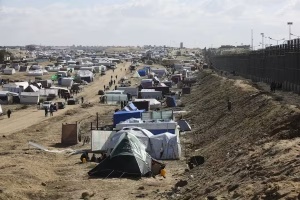
Stephen Zunes: No, you can’t. Especially since the area of Egypt and the area of Jordan that people would go to is largely desert. This is an agrarian and urban society. These aren’t nomads with their camels who’d be happy anywhere, despite the stereotypes… I think Europeans, especially the Germans, also have a lot of guilt around the Holocaust and the like and are reticent to push Israel too hard, but a number have cut off military-related transfers. And some are, making their recognition of Palestine contingent on changing Israel’s behavior. But even that’s a little weird, you know. You should recognize Palestine because if you support a two-state solution, you recognize both states. You shouldn’t have to make it dependent on the other’s behavior, necessarily. But anyway, they are trying to put pressure, and the protests in Europe and elsewhere are pretty extraordinary. I mean, even in faraway Australia, you have hundreds of thousands of people! It’s just quite amazing, because really, what’s at stake here, frankly? The post-World War II international legal system, especially in regard to international humanitarian law. And again, this is not the first genocide, and it is not the only genocide going on right now. But the fact is that most of these, historically and currently, are away from the cameras. Some people deny it or ignore it. You cannot deny or ignore this one. And unlike Sudan or Myanmar, where the government committing the genocide isn’t getting support from Western governments. So it is really critically important that we, the Europeans and Americans and others, recognize that. If we’re going to lose our credibility by allowing this to continue any longer. If there is a genocide somewhere, we say, “Oh, responsibility to protect, to send in the troops to save these people,” and people would say, “Oh, seriously? Do you really care about genocide, or is this an excuse for another Western imperialist intervention, or whatever?”
How can you say to Russia, “You can’t expand your territory by force. You can’t go around bombing civilians,” when we support what Israel is doing.
And if the country as powerful as Israel, as powerful as the United States, and as powerful as the Western European countries essentially says, “You know, international humanitarian law does not apply to us or our allies. Or we can’t do it, or we won’t do it. We see it going on, and we don’t like it, but we won’t do anything about it.” That just gives license to the terrorists and others saying, “Hey, with all your resources, you don’t abide by these international humanitarian laws. Why should we?”
Wyoming Star: What’s your assessment of the protest movement? What piece is missing to make it work, to put enough pressure on the governments?
Stephen Zunes: It needs to grow, and we need to build alliances. And this is a good time, because public opinion is really shifting now, and I think we can do it. The problem is, and we’ve seen this before, especially in campus-based movements, that some people, out of their horror of what they see as going on, will flip to the other extreme and actually start defending the actions of whoever’s fighting them. If you think back to the Cold War, I grew up in the student left in the 1970s, when some people did have this kind of romantic attachment to these armed socialist revolutions. And even though they were, in most cases, more authoritarian and militaristic for my taste. They really did seem a more progressive force compared to these right-wing military juntas and colonial armies and neocolonial whatever that the United States was supporting. You can’t say the same for Hamas. Hamas is decidedly reactionary. They really are a terrorist organization. They really are bad news, as is Iran. And I think it’s really critical that the movement not glorify Hamas in any way whatsoever, not justify terrorism. Yes, people under military occupation have the right to resist, even with armed resistance, but nobody has a right to kill civilians. And so I think only a minority support Hamas, just like only a minority in these other anti-war movements support the communists. But it’s particularly important in this case that these voices be marginalized, as they should be. It’s fine to believe that whatever emancipatory progress that Zionism offered some Jews doesn’t make up for the terrible things that Zionism has done to the Palestinians and everything else, and therefore you are an anti-Zionist. That’s fine. I don’t disagree with that. But to say you have to be anti-Zionist in order to be part of our movement. I think we’re not going to build a broad enough movement if we don’t include others who are appalled with what’s going on and want to stop US aid. And we are going to also be very careful about anti-Semitism.
Yes, the vast majority of the attacks on the movements claiming anti-Semitism are false or exaggerated. But like racism, sexism, and everything else, there are elements of antisemitism within the movement, and we don’t want to have a crying wolf phenomenon where the false charges make it difficult to recognize the minority of cases that are real.
And we need to call that out, including some of the more subtle ones. Again, the tendency is to exaggerate the power of AIPAC or the Zionist lobby, to say that it’s all their fault, and not look at the broader issues, including US hegemonic goals in the region and the genuine ideological attachment that some people have. Because exaggerating the power of the lobby, or brushing Zionists as this kind of conspiratorial thing, is like what some people used to say about Jews. Zionist control whatever—finance, that kind of thing—that’s just the old anti-Semitic theme: exaggerating Jewish power. The people who are responsible for US support for Israel are the overwhelmingly non-Jewish politicians.
Wyoming Star: So, we are basically shifting the blame.
Stephen Zunes: Yeah, and those are the people we need to focus on and recognize that it is part of a long, sordid history of US support for dubious allies doing horrible things, and try to avoid the temptation to blame it on a religious or ethnic minority. The one that may have a lobby that can influence some members of Congress sometimes.

Wyoming Star: I would like to finish off with a broader question about your expectations for the future. How do you see this going forward? Is there a chance for a peace process, or is it going to be a completed genocide?
Stephen Zunes: Well, the good news is the way that US public opinion is changing. I think within a decade or so we will have a government that is willing to put pressure on Israel, to threaten to withhold aid. What we eventually did in places like Central America, Southeast Asia, Southern Africa, and other cases where the US has intervened or supported an ally doing terrible things. The issue, though, is how many people are going to die in the long time, because you cannot crush nationalism. You cannot deny people their right to self-determination, either as their own state or within a single state with equal rights. And there is a recognition, which I think many have come to, that Israelis do have a distinct identity that should be honored. But we should not allow them to control or dominate others or insist that they have more rights than other people. So it’s going to be resolved eventually in an equitable manner, but it could be many decades and hundreds of thousands of lives.
Wyoming Star: And it will require a new leadership, considering the fact that the older generations are more supportive of Israel.
Stephen Zunes: Even more than LGBTQ issues. I’ve never seen an issue where the political opinion and age are such a straight line as they are with Israel-Palestine. It’s quite remarkable. I mean, the younger generation is much more pro-Palestinian, or at least more balanced in their view, compared to the older generation. When I first started teaching US policy and Middle East policy almost 40 years ago, I would bend over backwards to make sure people were familiar with the Palestinian narrative. Because people were already familiar with the Israeli narrative, I had to make sure they knew the Palestinian narrative. Now, if anything, it’s the other way around. It’s been quite a remarkable shift.
Wyoming Star: Do you see a similar push to stop this inside Israel?
Stephen Zunes: The problem is, even though American Jews, Jews in the diaspora, are becoming more and more liberal, progressive, and balanced, or however you want to say it, regarding Israel and Palestine, Israel has been moving more and more to the right. Part of it’s simply demographic, in that the more religious, ultra-nationalist, conservative people have big families, and the more liberal, secular Israelis have smaller families, and half of their kids are now living in Berlin or somewhere in Europe, because they don’t like the way Israel is going. And part of it is because, again, when the United States gives them a blank check, they figure they can get away with it. And the few times Israel’s backed off are when the public opinion has shifted to a more moderate position. It’s been when the United States put pressure on. And so, Israel will continue moving to the right as long as they think they can…
Wyoming Star: But is it economically sustainable in the end? It’s basically a war on five fronts. The support is enormous, but bombs cannot feed the Israelis.
Stephen Zunes: It is an issue, and it is doing some genuine damage. And there could be a backlash on that, but again, if you’re giving tens of billions of dollars of subsidies from the United States, that makes it easier.
Wyoming Star: 60% of Israeli economy is high-tech. It’s medical technology, military technology, and surveillance technology. What will happen if these people leave Israel?
Stephen Zunes: And more and more of them are leaving. And eventually people will see that boycotting is the way to go. It’s what forced the South Africans to end their apartheid system, and maybe people will start targeting Israeli companies more and more as well.

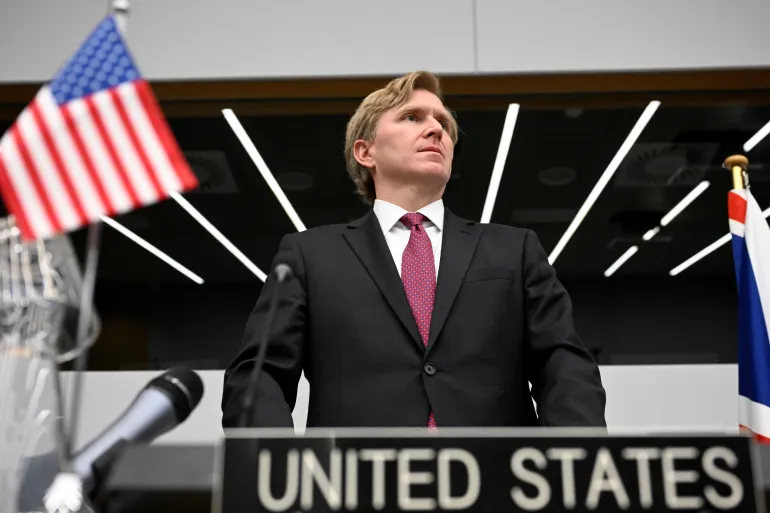







The latest news in your social feeds
Subscribe to our social media platforms to stay tuned